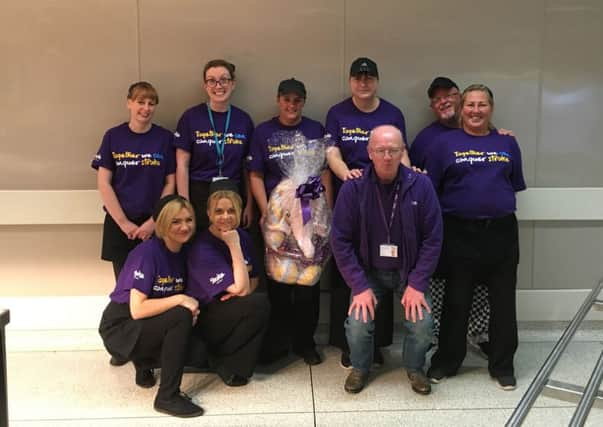Stroke survivor adds voice to '˜Lost for Words' campaign


William suffered his stroke in April 2010 when he was 54 years old. He was coming home from work and was parking outside his house when he lost power in his arm. His neighbour later found him slumped over in the car – unable to move. Following his stroke William experienced severe aphasia – a communication disability which affects around a third of stroke survivors.
William said: “After my stroke I couldn’t communicate and lost mobility down my right hand side. I knew what I wanted to say but I couldn’t get the words out– it was terrifying. The Stroke Association Speech and Language Therapy group in Antrim helped me find my words again – and gave me back my confidence.
Advertisement
Hide AdAdvertisement
Hide Ad“Now I volunteer my time to help other stroke survivors in their recovery. Being lost for words is frightening and makes coping with the physical effects of stroke that bit more difficult. Although my speech hasn’t returned completely, I’ve learnt new ways to communicate. I couldn’t have done this without the help of the amazing speech and language therapists who helped me.”
The Stroke Association’s Lost for Words campaign aims to raise awareness of the challenges stroke survivors with communication difficulties can face, and promote the help and support available.
Barry Macaulay, NI Director at the Stroke Association, said: “After a stroke, around one in three people like William have difficulty communicating, which can be both terrifying and isolating. William really is an inspiration. When William first joined the Stroke Association he had a very limited communication, but with the help of our Speech and Language Therapist and William’s hard work and determination, his recovery has gone from strength to strength.
“William has learnt alternative communication techniques so that he can communicate effectively with family and friends – such as using his ipad and apps. William has also shared his story with students at local universities as part of health and social science courses. He also volunteers with our Antrim Speech and Language Therapy groups where he helps support group members with activities. He inspires others by sharing his experiences and demonstrates that with the right support, there is life after stroke.”
Advertisement
Hide AdAdvertisement
Hide AdMore than 350,000 people in the UK have aphasia, a communication disability which can be caused by stroke. The Stroke Association is urging people to show their support for stroke survivors who are lost for words and make a donation. For more information, visit www.stroke.org.uk/lostforwords.
The Stroke Association has two support groups in Antrim, based in Greystone Community Centre as well as a Stroke Recovery Service. For more information on our services in the Antrim area – contact Janet Thompson, Stroke Association Stroke Recovery Coordinator, on 079 47273763 or email [email protected].